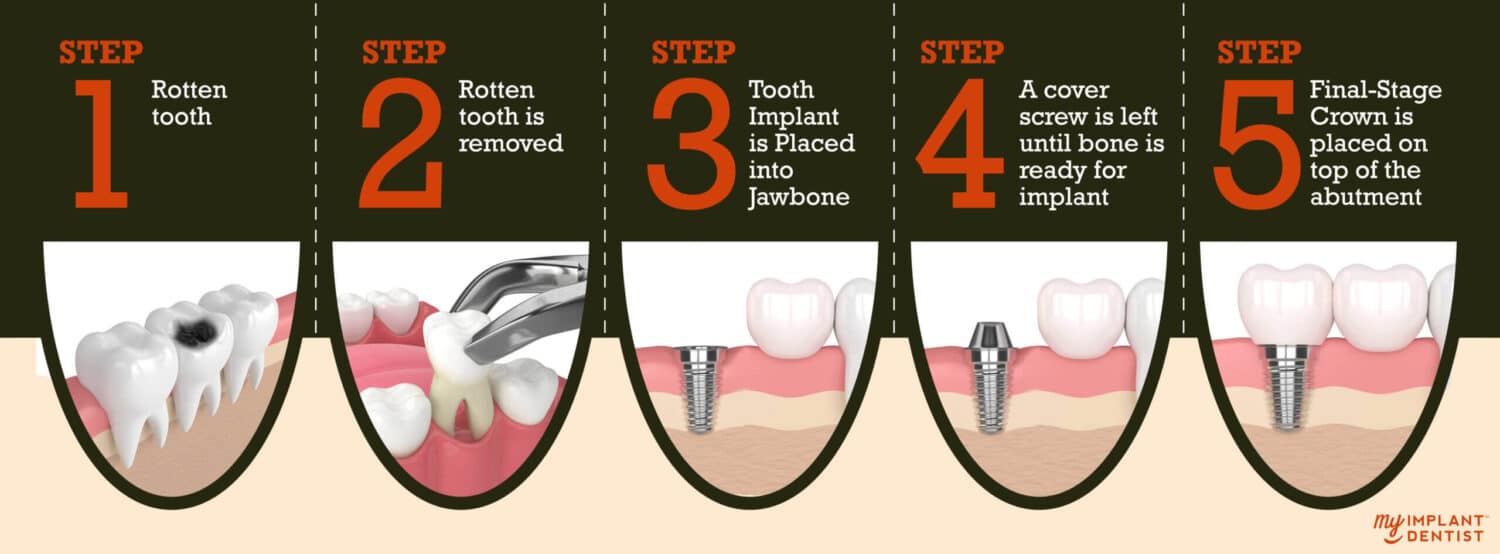Contents
- 1 What Is a Dental Implants Procedure?
- 2 Dental Implants Procedure Step by Step
- 3 What Happens During A Dental Implant Procedure?
- 4 How Long Does A Dental Implant Procedure Take?
- 5 What To Expect After A Dental Implant
- 6 What Are the Alternatives to Dental Implants?
- 7 Dental Implant Procedure For Replacing Multiple Teeth
- 8 Dental Implant Procedure For Replacing a Single Tooth
- 9 Care And Maintenance of Dental Implants
- 10 Recovering From The Surgery
- 11 Cost of Dental Implants
- 12 Conclusion
- 13 faqs
Dental implants are a great way to replace missing teeth and give you a beautiful, natural-looking smile.
An oral surgeon or periodontist typically performs the implant procedure, and it’s important to know what to expect before and after the surgery.
This straightforward guide to dental implant treatment includes a step-by-step overview of the dental implant procedure.
You’ll also learn what’s required for a successful recovery.
What Is a Dental Implants Procedure?
A dental implant procedure is a surgical technique that replaces missing teeth with artificial ones. The process involves inserting a titanium implant into the jawbone, which acts as a root for the new tooth. This multi-stage procedure includes consultation, treatment planning, implant placement, healing, and crown placement, typically spread over several months.
Dental Implants Procedure Step by Step

- Initial Consultation & Preparation
The first step in the dental implant process is to schedule a consultation with an implant dentist.
During the consultation, the dentist will examine your mouth and take X-rays to determine if you are a good candidate for implants. Then the dentist will develop a treatment plan.
The next step is to have a CT scan, which will be used to create a 3D model of your mouth. The implant surgeon will use this model to plan the placement of your implants.
Next, you must have your teeth cleaned and any necessary extractions performed. Once your mouth is prepared, you undergo surgery to place the implants.
- Placing the Implant (surgery day)
The first step in the dental implant procedure is to place the titanium post into the jawbone where the tooth is missing. This is done through a minor surgical process. Once the implant is placed, it will need to fuse with the jawbone, a process called dental osseointegration. This can take several months.
- Abutment Placement
Abutment placement is placing an abutment (a support structure) in a prepared location on a tooth. This is typically done as part of a dental implant procedure. The abutment is then secured in place with a screw. Once the abutment is in place, it serves as a connection point between the dental implant and the dental prosthetic (e.g., a dental crown).
- Fitting The Dental Crow (3 to 6 months after surgery)
Three to six months after the surgery, the osseointegration has taken place, fusing the dental implant to your jawbone. You are now ready to receive your dental crown. The crown can be made from porcelain or ceramic to match your other teeth.
What Happens During A Dental Implant Procedure?
It typically takes many months and a succession of minor procedures and exams to complete a dental implant.
- Before the implant is placed, the dentist will take scans and X-rays to get a clear picture of the area, including the gum tissue.
- The dental implant is anchored in the patient’s jaw during this quick procedure. The anaesthetic will keep you from feeling anything while the surgery is performed.
- Once the implant has been in place for a few months, new bone will form around it.
- The dentist will then construct an abutment for the implant and attach the replacement tooth or teeth to the abutment.
In the future, the dentist will take an impression of the mouth to create false teeth. At last, the fake tooth or teeth are anchored to the implant.
How Long Does A Dental Implant Procedure Take?
Dental implant surgery takes one to 5 hours, depending on the number of implants placed and the procedure’s complexity.
The length of time required for a dental implant process can vary depending on several factors, such as how many teeth need to be replaced and the condition of the patient’s jawbone.
This is followed by a healing period of several weeks or months, during which the implant will fuse with the jawbone.
What To Expect After A Dental Implant
Dental implants Perth are a great way to replace missing teeth and have been used for over 30 years. They are strong, durable and look just like your natural teeth. You should know and expect some things after having dental implants placed.
- You will likely experience some swelling and bruising around the implant site. This is normal and will go away after a few days.
- You may also have some mild discomfort, which can be controlled with over-the-counter pain medication.
It is important to keep the implant site clean by brushing and flossing regularly. You should also see your dentist for regular checkups to ensure the implant is healing properly.
What Are the Alternatives to Dental Implants?
The alternatives to dental implants include dental bridges, partial or full dentures, and removable partial dentures or “flippers.” Dental bridges use adjacent teeth for support, while dentures are removable appliances that replace multiple or all missing teeth. Removable partial dentures are temporary, cost-effective options. The best alternative depends on factors like oral health, budget, and personal preferences.
Dental Implant Procedure For Replacing Multiple Teeth
All-on-4 treatment
This is a type of dental implant procedure that involves placing just four implants in the jawbone to support an entire arch of replacement teeth (either the upper or lower jaw). This can be a more cost-effective and less invasive option than placing individual implants for each missing tooth.
Dental Implant Procedure For Replacing a Single Tooth
The process for replacing a single tooth with a dental implant is similar to the procedure for multiple teeth but only involves one implant and one replacement tooth (called a crown).
Care And Maintenance of Dental Implants
Dental implants require the same care as natural teeth, including brushing, flossing, and regular visits to the dentist for cleanings and check-ups.
It is important to keep the implant clean to prevent infection and maintain good oral hygiene.
Dental implant crowns may need to be replaced every 10-15 years, depending on the material used and the individual’s oral hygiene habits.
Recovering From The Surgery
Most people who have dental implant surgery have no problems with their dental implants. There may, however, be some swelling and bruising around the implant site, during the healing time, for the first few days after surgery.
You can usually control this by placing ice on the area for 20 minutes at a time, several times a day. You should also keep your head elevated when you sleep for the first few nights following surgery. These measures will help reduce any swelling and bleeding.
Cost of Dental Implants
The cost of dental implants typically ranges from $5,000-$7,500 per tooth. This cost varies based on the number and type of implants and the complexity of the procedure. Despite the upfront cost, dental implants are a durable, long-term solution for missing teeth.
Conclusion
We hope this guide has given you a better understanding of the dental implant procedure and what you can expect. Please contact us if you have any questions or would like to schedule a consultation. My Implant Dentist would be happy to help you get the smile you’ve always wanted!
faqs
Does Insurance Pay For Dental Implants?
Yes. Some insurance policies do cover a percentage of the cost of dental implants. However, before proceeding, it is critical to understand the type of treatment you require and what your insurance will cover.
Is Dental Implant A Major Surgery?
Dental implant surgery is mostly minor, just like taking out a tooth. But there may be other steps to getting dental implants, like bone grafting. This extra step is needed for people who need surgery but don’t have enough bone or a tooth next to the area.
How Painful Is Getting A Dental Implant?
A patient with healthy bones and minimal soft tissue surgery might expect a pain level of two to three in the first twenty-four to forty-eight hours after a routine dental implant procedure.
How Long Do Implants Take To Heal?
A dental implant treatment typically requires 6-8 months of recuperation time. However, this time frame might be significantly longer if other methods, like bone grafting, are required.





















